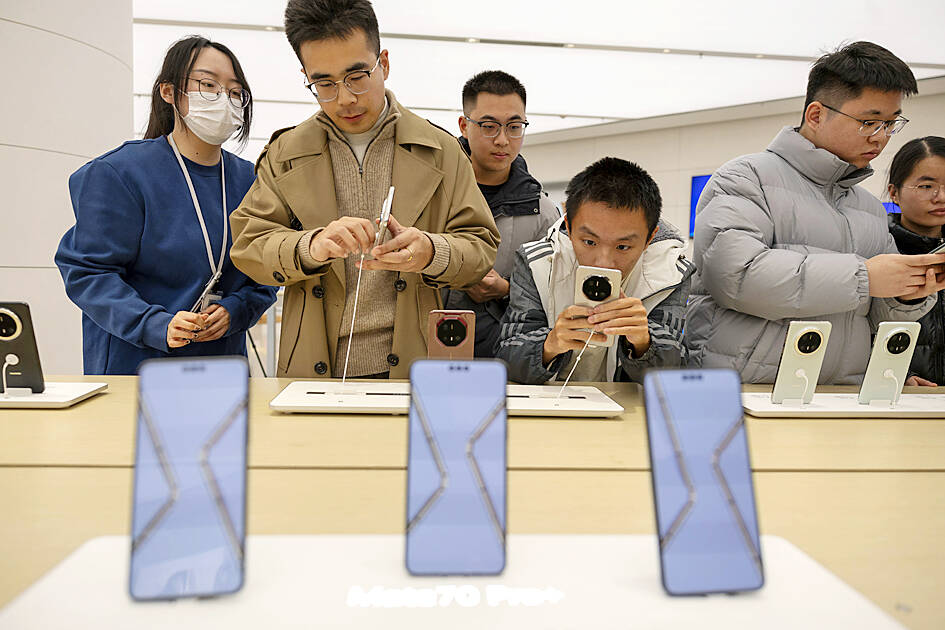China is to subsidize more consumer products and boost funding for industrial equipment upgrades, ramping up a program to bolster domestic consumption in the face of growing headwinds for exports.
Consumers would qualify for a 15 percent subsidy for buying new mobile phones, tablets and smartwatches under 6,000 yuan (US$818) this year, according to an official notice published yesterday by the Chinese National Development and Reform Commission (NDRC) and the Chinese Ministry of Finance. The benefit is capped at 500 yuan for up to one device in each category.
The authorities would also expand the types of home appliances eligible for state support to 12 from eight last year to include products such as dishwashers and rice cookers, the notice said.

Photo: EPA-EFE
The two other new consumer goods covered by the initiative this year are microwaves and water purifiers. Consumers would also get more cash compensation from the government for spending on decoration materials to refurbish homes, the notice said.
China has made boosting consumption a higher priority this year as it looks to fight deflation amid subdued household and business confidence. Exports as a growth engine might also lose steam as trade tensions with the US would likely intensify with US president-elect Donald Trump returning to the White House later this month.
A trade-in subsidy for electric vehicles (EVs) and hybrids was also renewed. The cash-for-clunkers program gave a big boost to sales — especially of EVs and hybrids — after its introduction last year, with more than 3.7 million vehicles purchased under the program.
New agricultural machines have also been added under an initiative to subsidize industrial equipment upgrades. Companies in sectors such as electronic information and work safety are included to get the benefit this year.
NDRC Vice Chairman Zhao Chenxin (趙辰昕) said yesterday the program plays an important role in “expanding effective investment, boosting consumer demand, promoting green transformation, and improving people’s livelihood.”
Investors were unimpressed by the latest effort, sending stocks tumbling in the morning. They erased the losses briefly in afternoon trading on purchases by exchange traded funds known to be favored by the “national team” before falling again. The Shanghai Composite index barely moved at the close, while Hong Kong’s Hang Seng Index dropped nearly 1 percent.
The authorities would continue to distribute ultra-long special sovereign bond funds among local governments to help them hand out subsidies to consumers under the program this year, the notice said.
The central government has already extended 81 billion yuan to local authorities to support the program this year, senior Chinese Ministry of Finance official Fu Jinling (傅金玲) said at the briefing.
The authorities would also arrange funds raised from the sales of ultra-long sovereign special bonds to provide loan discounts for companies to upgrade to new equipment on top of the 1.5 percent compensation already offered by the central government, the ministry said.

Real estate agent and property developer JSL Construction & Development Co (愛山林) led the average compensation rankings among companies listed on the Taiwan Stock Exchange (TWSE) last year, while contract chipmaker Taiwan Semiconductor Manufacturing Co (TSMC, 台積電) finished 14th. JSL Construction paid its employees total average compensation of NT$4.78 million (US$159,701), down 13.5 percent from a year earlier, but still ahead of the most profitable listed tech giants, including TSMC, TWSE data showed. Last year, the average compensation (which includes salary, overtime, bonuses and allowances) paid by TSMC rose 21.6 percent to reach about NT$3.33 million, lifting its ranking by 10 notches

Popular vape brands such as Geek Bar might get more expensive in the US — if you can find them at all. Shipments of vapes from China to the US ground to a near halt last month from a year ago, official data showed, hit by US President Donald Trump’s tariffs and a crackdown on unauthorized e-cigarettes in the world’s biggest market for smoking alternatives. That includes Geek Bar, a brand of flavored vapes that is not authorized to sell in the US, but which had been widely available due to porous import controls. One retailer, who asked not to be named, because

SEASONAL WEAKNESS: The combined revenue of the top 10 foundries fell 5.4%, but rush orders and China’s subsidies partially offset slowing demand Taiwan Semiconductor Manufacturing Co (TSMC, 台積電) further solidified its dominance in the global wafer foundry business in the first quarter of this year, remaining far ahead of its closest rival, Samsung Electronics Co, TrendForce Corp (集邦科技) said yesterday. TSMC posted US$25.52 billion in sales in the January-to-March period, down 5 percent from the previous quarter, but its market share rose from 67.1 percent the previous quarter to 67.6 percent, TrendForce said in a report. While smartphone-related wafer shipments declined in the first quarter due to seasonal factors, solid demand for artificial intelligence (AI) and high-performance computing (HPC) devices and urgent TV-related orders

Prices of gasoline and diesel products at domestic fuel stations are this week to rise NT$0.2 and NT$0.3 per liter respectively, after international crude oil prices increased last week, CPC Corp, Taiwan (台灣中油) and Formosa Petrochemical Corp (台塑石化) said yesterday. International crude oil prices last week snapped a two-week losing streak as the geopolitical situation between Russia and Ukraine turned increasingly tense, CPC said in a statement. News that some oil production facilities in Alberta, Canada, were shut down due to wildfires and that US-Iran nuclear talks made no progress also helped push oil prices to a significant weekly gain, Formosa said